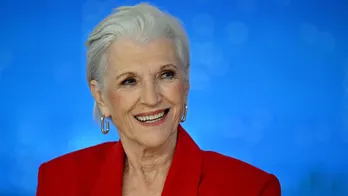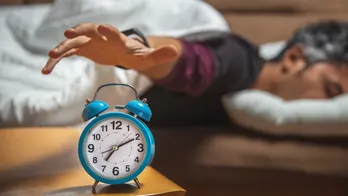Military veteran embraces ‘new service’ of helping others after his Parkinson's diagnosis : ‘There is hope'
After 17 years of serving his country, Mark Kelm is now providing a different type of service: He's advocating for others who, like him, are living with Parkinson’s disease (PD).
Kelm, who lives in a small Minnesota town with his wife of 23 years and three children, was just 38 years old when he was diagnosed with PD, a nervous system disorder that causes tremors, stiffness, loss of balance and other movement issues.
He credits his military background for preparing him for this latest challenge.
WHAT IS PARKINSON'S DISEASE? SYMPTOMS, CAUSES, WAYS TO COPE WITH DIAGNOSIS
"I believe the times that I had in the military really prepared me to handle living with a disease like Parkinson's — knowing how to adapt and overcome in any given circumstance," he told Fox News Digital in an interview.
"And I think those life skills that I learned in the Army are still quite useful today."

After 17 years of serving his country, Mark Kelm is now providing a different type of service: He's advocating for others who, like him, are living with Parkinson’s disease. He's shown in the family picture at left, center, plus on the right. (Mark Kelm)
Surprise diagnosis
Raised by a police deputy and a nurse, Kelm said that for as long as he can remember, his life has been geared toward service.
Since enlisting in the Army Reserves in 1989, Kelp has served many years of active duty, spent time in the National Guard and held a role as a military chaplain.
In 2006, Kelm transitioned to a role as a chaplain for a federal law enforcement agency.
Two years later, at just 38, he was alarmed when he started experiencing involuntary twitching.
RESEARCHERS FIND SOURCES OF FOUR BRAIN DISORDERS, WHICH COULD LEAD TO NEW TREATMENTS
"One muscle in my arm kept twitching, and it was causing my finger to twitch as well, and it just wouldn't stop," he recalled.
That began Kelm’s journey toward a diagnosis of young-onset Parkinson’s, which he received at the Mayo Clinic’s neurology department in Minnesota.
"That was a pretty dark day — knowing that it's a progressive, degenerative neurological disorder that currently does not have a cure or any disease-modifying drugs," he said.

Mark Kelm, pictured at right, enlisted in the Army Reserves in 1989 and served for many years in active duty. (Mark Kelm)
"As a chaplain, I performed funerals for people who had died from complications of Parkinson's. So I was very familiar with some of the end-stage aspects of the disease."
Kelm started taking Levodopa, a central nervous system drug that helps to manage Parkinson's motor symptoms.
"I believe the times that I had in the military really prepared me to handle living with a disease like Parkinson's."
For eight years, he "stayed quiet" on the disease. In 2016, he said, "It was affecting me enough that I no longer could hide it."
That’s when Kelm retired from full-time work — but his next chapter was just beginning.
New form of service
"After having my own little pity party after my diagnosis, I realized that wasn’t really helpful," he said.
Kelm’s older daughter, who was in high school at the time, immediately started researching his disease. She soon became involved with fundraising and awareness efforts through the Parkinson’s Foundation.

Kelm, at right, is pictured on a mission trip to Uganda in 1998 while he was serving as a military chaplain. (Mark Kelm)
He was so impressed by his daughter’s efforts that he decided it was time to "get off the bench and get back into the game."
Kelm has since "jumped in with both feet."
He became the national chair of the Parkinson’s Foundation People with Parkinson’s Council, which ensures that the perspective of people living with PD is integrated into the foundation’s program development.
PARKINSON'S DISEASE SYMPTOMS DISAPPEARED WITH EXERCISE, MAN CLAIMS: ‘USE IT OR LOSE IT’
In 2020, Kelm helped create an annual Parkinson's Awareness Day at Target Field, in partnership with the Minnesota Twins.
He has also organized events to raise funds for the Minneapolis-based Struthers Parkinson's Center, and volunteers on the U.S. Department of Defense's medical research programs for Parkinson's.
"My service is connected to Parkinson's now," Kelm told Fox News Digital.

Kelm, at far right, is pictured with his family during a visit to the Grand Ole Opry in Nashville, Tennessee. (Mark Kelm)
"It has been an absolute blessing, because it's allowed me to meet people from all around this great nation and even the world," he went on.
"It's been very positive for me, and I’m very hopeful that there's a lot of research being done right now."
Kelm’s advocacy could also indirectly benefit his health, according to Dr. James Beck, PhD, chief scientific officer for the Parkinson’s Foundation in New York City.
"My service is connected to Parkinson's now."
"The symptoms of PD – slowness of movement, difficulty in movement, etc. – can shrink a person’s world," Beck told Fox News Digital.
"Mark’s effort to be involved and make a difference has helped him learn more about his own disease and to be a model advocate for his own care and health."
What to know about early-onset Parkinson’s
People who are diagnosed with Parkinson’s before age 50 are considered early-onset patients.
Just 4% of people are diagnosed before the age of 50 — and Kelm was one.
Early-onset patients are three times as likely to have a genetic form of the disease, according to Beck.

In 2020, Kelm helped to create an annual Parkinson's Awareness Day at Target Field, in partnership with the Minnesota Twins. (Mark Kelm)
"People with EOPD typically have a much slower rate of progression of their disease than those diagnosed at an older age," Beck noted.
Younger patients, however, are more likely to notice stiffness earlier in the course of the disease.
"They will often experience dystonia (e.g., cramping of a hand or toes) as an early symptom," Beck said.
IS PARKINSON’S DISEASE, 'WORLD’S FASTEST GROWING BRAIN DISEASE,’ MOSTLY PREVENTABLE? STUDY OFFERS CLUES
Patients with early-onset disease will also often experience levodopa-induced dyskinesia (involuntary movements of body parts) more frequently than those diagnosed after the age of 50, according to Beck.
Kelm said he does experience dyskinesia from time to time.
"At first, I thought, ‘I’m going to beat this,’" he said. "And after a few years, I started having some swallowing issues, which led to choking while eating."

Kelm is pictured with his wife of 23 years, Beth Kelm. "She is the rock of the family. She does 99% of the work, and I go in for the 1% of glory." (Mark Kelm)
"It was a wake-up call, and an awareness that I needed to do more to manage the disease."
Coming to terms with his mortality was tough, Kelm acknowledged — but he found some comfort in knowing.
"I found peace in knowing that everything is going to be OK."
"You don't die from Parkinson's — you die with Parkinson's," he said. "You die from complications of the disease, especially if you're younger. And I found peace in knowing that everything is going to be OK."
He added, "All of us are going to leave this earth one way or another. Some of us are given knowledge beforehand, while others are not."
The military-Parkinson’s link
There are currently more than 110,000 veterans with Parkinson’s disease who receive care through the U.S. Department of Veterans Affairs (VA), according to the Parkinson’s Foundation.
In 2009, the Health and Medicine Division of the National Academy of Sciences, Engineering, and Medicine released a report stating that there is "suggestive but limited evidence that exposure to Agent Orange and other herbicides used during the Vietnam War is associated with an increased chance of developing Parkinson's disease."

Second from right, Kelm is pictured delivering tailgate Communion while serving as a military chaplain. (Mark Kelm)
As the Parkinson’s Foundation stated, PD is a "presumptive condition for veterans who were exposed to Agent Orange and certain other toxins during military service."
Due to this designation, veterans with Parkinson’s who were exposed to these toxins are automatically eligible to receive health care and disability benefits from the VA.
Beck of the Parkinson’s Foundation said it makes sense that there could be a link between PD and military service.
MILITARY MENTAL HEALTH IS FOCUS AS AI TRAINING SIMULATES REAL CONVERSATIONS TO HELP PREVENT VETERAN SUICIDE
"Although I have not seen a report of a direct increase in PD after military service, given the environmental exposures of many of our service members – head trauma, solvent exposure, etc. – it would not surprise me to see a higher prevalence of PD among veterans," he told Fox News Digital.
Kelm noted that although the U.S. veteran population is getting smaller, the Parkinson's rate within the community is "increasing significantly."

Kelm and his family are pictured at the Minnesota Twins game on Parkinson's Awareness Day at Target Field. (Mark Kelm)
He told Fox News Digital, "I suffered two TBIs (traumatic brain injuries) in service, which the VA believes likely contributed to my Parkinson's, along with chemical exposure."
The Parkinson’s Foundation partnered with the VA in 2020 in an effort to improve the health, well-being and quality of life for veterans with PD and their loved ones.
Breaking the stigma
Many military veterans with Parkinson’s find it difficult to bring themselves to ask for help after so many years of supporting others. This was the case for Kelm after his diagnosis.
"As a chaplain, my job was for people to come to me — not for me to seek them out."
"I was in a pretty dark place at first," he recalled. "As a chaplain, my job was for people to come to me — not for me to seek them out."
A doctor at Struthers Parkinson’s Center in Minnesota recognized that Kelm needed help and physically walked him to a psychologist’s office.
BOOST BRAIN HEALTH AND SLOW MENTAL AGING WITH 10 INTRIGUING TIPS FROM LONGEVITY EXPERTS
"I sat down and started talking, and it really was my awakening — an awareness of how much I needed to listen to another person and have them sort through things."
The psychologist helped Kelm realize that he could continue to serve others while also allowing others to serve him.

Second from right, Kelm is pictured during a mission trip to Uganda, during which the group helped to build a school for women. (Mark Kelm)
Over time, people in the Parkinson’s community began calling on Kelm to help others with young-onset PD who had recently been diagnosed.
"I want to reach out to as many people as possible and get them the help they need to live the best quality of life that they can," he said.
"I want to let them know that there is hope. It’s not all darkness — there is light. They still have a lot of life to live."
Guided by hope and faith
During the harder days, Kelm finds encouragement and comfort in his faith.
"It’s the belief that no matter what happens, I don't have to fear, because I know God is is with me," he said.
"I have hope that as my body becomes weaker, God's strength will become more and more evident."
"I have hope that as my body becomes weaker, God's strength will become more and more evident."
Kelm said he is also optimistic that headway is being made toward improved Parkinson’s treatments and a future cure.

He is optimistic, said Kelm, that headway is being made toward improved Parkinson’s treatments and a future cure. "The needle's moving in the right direction," he said. (Mark Kelm)
He is encouraged by the increases in fundraising and research.
"I'm hoping that I get to live until I'm 80 and chase grandkids around. But for that to happen, we're going to have to do the research, so that science can point us in the right direction."
CLICK HERE TO SIGN UP FOR OUR HEALTH NEWSLETTER
For others who are newly diagnosed, Kelm urges them to seek help and build a network — which may include a counselor or therapist, religious leaders, doctors, physical therapists or a speech therapist.
"Allow others to help you," he encouraged. "It's hard at first. You might think you can fight the disease and manage the struggle on your own. But even Jesus had help carrying the cross."
For veterans with Parkinson’s, Kelm urges them to seek support from the VA.

"I'm hoping that I get to live until I'm 80 and chase grandkids around," said Kelm, who is pictured with his family. "But for that to happen, we're going to have to do the research, so that science can point us in the right direction." (Mark Kelm)
"Look around, ask and talk to others, and you will find dedicated people who will allow you to flourish as you live with your Parkinson's disease."
Beck echoed the importance of being open about a diagnosis to "help bring Parkinson’s out of the shadows … It can be a difficult first step, but is worth it in the end," he said.
CLICK HERE TO GET THE FOX NEWS APP
"Loved ones will often already know something is amiss. Sharing your PD diagnosis with them will often result in relief at knowing what is wrong, and the opening of tremendous support."
People can call the Parkinson’s Foundation’s free helpline at 1-800-473-4636, or can visit parkinson.org or parkinson.org/veterans for information about where to get support.
Fox News Digital reached out to the U.S. Department of Veterans Affairs requesting additional comment.
For more Health articles, visit www.foxnews.com/health.
Disclaimer: The copyright of this article belongs to the original author. Reposting this article is solely for the purpose of information dissemination and does not constitute any investment advice. If there is any infringement, please contact us immediately. We will make corrections or deletions as necessary. Thank you.







